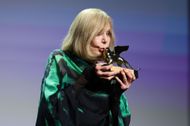Blanche Kral Novak, who passed away in 1984, was the mother of Hollywood icon Kim Novak. Behind the glamour of Novak’s stardom lay a childhood that the actress later described as both turbulent and formative.
Kim Novak became one of the screen’s brightest stars in the 1950s, yet her fame burned quickly. She turned her back on Hollywood by the late 1960s, appearing only occasionally afterward. The actress spent nearly two decades away from film before returning for her final performance in 1991’s Liebestraum. Her personal story now unfolds in Alexandre O. Philippe’s documentary Kim Novak’s Vertigo.
As per People Magazine, Kim Novak returned to her earliest childhood memories in the documentary. She also described going with her sister into their father’s basement workshop and finding a jar that, according to her father, held the remains of a sibling. Then, in striking candor, she told the story of her own birth. The Vertigo actress said:
“The Depression caused so much hardship, my mom got pregnant, and she just couldn’t afford to have a child. She tried to abort me with knitting needles. But she wasn’t able to do it in this case, so I was born, but I know that she tried to suffocate me with a pillow, and I always had breathing issues.”
Kim Novak reflected on how her mother’s words guided her through life beyond Hollywood

For Kim, her mother's memories were not entirely defined by fear. As per the documentary, she also recalled moments of tenderness that allowed her to see Blanche Kral Novak in a different light. Those memories, she suggested, helped balance the narrative of her early struggles with glimmers of inspiration. She said:
“My father was like, no one can succeed, but my mom was very confident, and her eyes sparkled and twinkled and she was so full of wanting to express the joy of life.”
The actress's words drew a portrait of a household where negativity and optimism often collided. Novak explained that her mother encouraged her to believe in her own agency:
“I can still hear her telling me, or really making me tell me by looking in the mirror that I am the captain of my own ship, that I can be in charge of myself and what I do and how I create my image to the world,” she explained.
For Novak, those lessons endured, even after decades away from the film industry, serving as a reminder of her strength and individuality.
Kim Novak honoured at Venice with lifetime achievement award and documentary tribute

Kim Novak was celebrated at the Venice Film Festival with a lifetime achievement award, accompanied by the premiere of a documentary on her life. The moment not only honoured her acting but also resolved her to resist the pressures of Hollywood throughout her career.
In an interview with The Guardian, Kim Novak expressed how much it meant to her, explaining:
“It’s incredible to feel appreciated and to receive this gift before the end of my life, I think I’m being honoured as much for being authentic as for my acting. It has sort of come full circle.”
Novak's haunting turn in Vertigo remained the cornerstone of her reputation. As both Madeleine and Judy, she gave performances that felt deeply personal:
“I identified so much with Judy and Madeleine because they were both being told to change who they really were, they had to become something that didn’t represent them,” she shared.
That instinct to hold onto Kim Novak's true self stretched back to her childhood in Chicago. Born Marilyn Novak to Czech immigrant parents, the actress grew up shy, artistic, and often bullied in a rough neighbourhood. She pursued art at the Chicago Art Institute while modelling to make ends meet, before being discovered on a trip to Los Angeles. Columbia Pictures signed her in 1954.
But stardom came with a cost. Studio boss Harry Cohn pressured Novak to drop her first name, declaring there could only be one Marilyn and sneering that “nobody’s gonna go see a girl with a Polack name.” She resisted losing her surname, but endured demands to slim down, cap her teeth, and bleach her hair. The actress said:
“They hired you because they thought you have something special, and then the first thing they’d do is try to give you a new face, they’d want the mouth of Joan Crawford, the hair of Jean Harlow. So by the time you left the makeup chair, it wasn’t even you any more. I needed to fight to keep my own sense of who I was.”
At Venice, the celebration of Kim Novak felt less like a farewell and more like a recognition of a woman who, against all odds, never stopped being herself.
Love movies? Try our Box Office Game and Movie Grid Game to test your film knowledge and have some fun!
